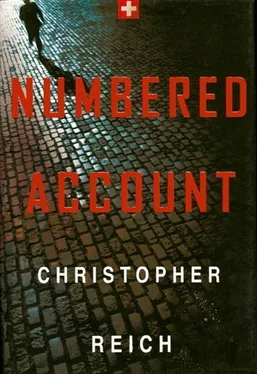Nick sat bolt upright on his stool, his attention rooted once again in the here and now. “What are you talking about? What rumors?”
“Nothing official,” Sprecher said quietly. “We’ll find out Tuesday morning. But it seems there’s too much hue and cry about our conduct these days. The banks have reasoned that they’d prefer to cooperate voluntarily rather than face some form of mandatory regulation. I don’t know the p’s and q’s of it, but for a little while at least, we’ll be helping the authorities gather some information about our clients. Not about everybody, mind you. The federal prosecutor will examine evidence presented him and decide which numbered accounts the authorities have a right to examine.”
“Jesus Christ. It sounds like a witch hunt.”
“Indeed,” agreed Sprecher. “They’re looking under every rock for the next Pablo Escobar.”
Nick caught his friend’s gaze, and he knew they were both thinking the same thing. Or the Pasha. “God have mercy on the bank who’s hiding him,” he said.
“And the man who turns him in.” Sprecher raised two fingers at the barman. “Noch zwei Bier, bitte.”
“Amen,” said Nick. But he wasn’t thinking about the beers.
At 8:30 A.M. the following Tuesday, a convocation of portfolio managers was held on the Fourth Floor. The subject was the bank’s response to escalating demands it formally cooperate with the United States Drug Enforcement Administration and other international agencies like it. The meeting constituted Nick’s first invitation to set foot on the hallowed Fourth Floor, known throughout the bank as the Emperor’s Lair—in deference to the Chairman—as well as his first visit to the executive boardroom.
The boardroom was cavernous. The doorway was twelve feet high, the ceiling twenty. Nick walked solemnly across a plush maroon carpet whose borders were inlaid with the symbols of Switzerland’s twenty-six cantons. At the carpet’s center, under a prodigious mahogany conference table, lay the seal of the United Swiss Bank: a black Hapsburg eagle rampant dexter on a mustard yellow field, its broad wings outstretched and three keys grasped in its talons. A swirling golden ribbon, captured in the eagle’s prominent beak, advertised the bank’s dictum: Pecuniat Honorarum Felicitatus. Money welcomed gladly.
Nick stood with Peter Sprecher at the room’s far corner, near the windows that overlooked the Bahnhofstrasse. He knew he should feel intimidated, but he was too busy watching the other portfolio managers. To a man, they gawked at the room’s trappings like a bunch of nervous tourists—pinching the port leather of the conference chairs, running a discreet hand along the burnished wood paneling, puffing up with pride as they studied the bank’s elaborate seal. It was the first visit to the Fourth Floor for many of his colleagues, too.
He shifted his view to the doorway and caught sight of Sylvia Schon entering the boardroom. She wore a black skirt and blazer. Her hair was pulled back severely into a tight bun. She looked smaller than he remembered, though not the least bit vulnerable in this sea of male executives. She moved around the room greeting her colleagues, smiling, shaking hands, and exchanging a hushed word here and there. It was a textbook display of working a room, and he was impressed.
Abruptly, the boardroom fell silent. Wolfgang Kaiser entered and strode to a chair positioned directly beneath a portrait of the bank’s founder, Alfred Escher-Wyss. Kaiser did not sit down but stood with one hand placed on the table before him. His eyes traveled the room, a general of the army appraising his troops before a perilous operation.
Nick stared at him intently. At his cold blue eyes, at his indulgent mustache, and at his limp arm that was buttoned to his left coat pocket. He recalled the first time he had met Kaiser, during his father’s last trip to Switzerland seventeen years ago. Then, he had been terrified of him. The booming voice. The spectacular mustache. It had been too much for a ten-year-old boy. Now, seeing him surrounded by his peers, he felt proud of his family’s association with him and honored that Kaiser had offered him a position at the bank.
Three men followed Kaiser into the room. Rudolf Ott, vice chairman of the bank (with whom he had interviewed in New York), Martin Maeder, executive vice president in charge of private banking, and last, close behind but a continent apart, an unknown gentleman, tall and reed thin, clutching a battered leather briefcase. He wore a navy suit whose stiff lapels cried out American—Nick should know, his own lapels were the same—and brown cowboy boots whose spit shine would have earned a long, low whistle from the toughest D.I.
Rudolf Ott called the meeting to order. He wore wire-rimmed spectacles and stood with the defensive posture of a man accustomed to ridicule. “As this bank’s representative to the Association of Swiss Banks,” Ott began, his Basler accent lending his words a nasal inflection, “I have in the past days met with colleagues in Geneva, Bern, and Lugano. Our discussions centered on measures that must be taken in light of current unfavorable winds, to avoid formal federal legislation mandating divulgence of certain confidential client information, not only to the office of the federal prosecutor but to a committee of international agencies. While the secrecy afforded our valued clients remains paramount to the Swiss philosophy of banking, a decision has been made to voluntarily comply with the demands of our federal government, the wishes of our citizens, and the requests of the international authorities. We must take our place at the table of advanced industrialized Western nations and help root out those individuals and companies using our services to spread evil and wrongdoing across the globe.”
Ott paused to clear his throat, and a murmur rose through the assembled ranks.
Nick looked at Peter Sprecher and whispered, “Weren’t we advanced and industrialized enough to sit at that table during the Second World War?”
“You forget,” Sprecher answered, “during the Second War, there were two tables. We Swiss simply couldn’t decide which one to sit at.”
Wolfgang Kaiser raised his head sharply, and silence descended on the room with the finality of a guillotine.
Ott lofted a hand in the gangly American’s direction. “The United States Drug Enforcement Administration has provided us with a list of those transactions which they define as ‘suspicious,’ and likely to be linked to criminal activities—in particular the laundering of money from the sale of illegal narcotics. To give you more detail about our proposed cooperation, I present Mr. Sterling Thorne.” He turned to Thorne and shook his hand. “Don’t worry, they won’t bite.”
Sterling Thorne did not appear unreasonably worried, thought Nick, as he watched the American agent face the assembly of sixty-five bankers. Thorne’s brown hair was unruly and cut a little too long, as if to say he didn’t belong with the pretty boys at headquarters. He had gunslits for eyes, and cheeks that in his adolescence had fought a battle against acne and lost. His mouth was small and weak, but his jaw could break a pickax.
“My name is Sterling Stanton Thorne,” began the visitor. “I am an agent for the United States Drug Enforcement Administration, have been for near twenty-three years. Lately, the powers that be in Washington, D.C., have seen fit to appoint me chief of our European Operations. That means that today I’m standing before you gentlemen asking for your cooperation in the war against drug trafficking.”
Nick recognized the type if not the exact model. Nearing fifty, lifetime in law enforcement, a civil servant masquerading as a latter-day Eliot Ness.
Читать дальше












